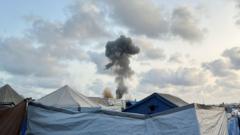As tensions escalate regarding the ongoing conflict in Gaza, British Prime Minister Sir Keir Starmer and Foreign Secretary David Lammy have voiced strong opposition to Israel's military operations which they deem as excessive and damaging in the eyes of the world.
Israel Faces Growing Condemnation from UK Leaders Amid Gaza Crisis

Israel Faces Growing Condemnation from UK Leaders Amid Gaza Crisis
UK leaders express intensified criticism of Israel's military actions as humanitarian conditions in Gaza deteriorate.
In a parliamentary address, Prime Minister Sir Keir Starmer described the humanitarian crisis in Gaza as "intolerable," particularly highlighting the plight of innocent children affected by the conflict. He criticized Israel's recent decision to permit a limited influx of aid, labeling it "utterly inadequate." Starmer expressed horror at Israel's escalation of military campaigns, indicating that the UK's patience with Israel is wearing thin.
Foreign Secretary David Lammy echoed this sentiment during a parliamentary debate, characterizing the situation in Gaza as "abominable." He condemned statements from Israeli officials suggesting a cleansing of Gaza's civilian population, emphasizing that such rhetoric isolates Israel from its allies and tarnishes its international reputation. Lammy's remarks came amid discussions that reflect a broader discontent with Israel’s actions, not just from the UK but from various global partners.
The EU has also joined the chorus of criticism, initiating a review of its long-standing association agreement with Israel, an indication of shifting diplomatic stances. The EU's foreign policy chief noted that a significant majority support reassessing the collaborative relationship established over 25 years ago.
On a global scale, France and Canada joined the UK in issuing a statement denouncing Israel’s military maneuvers, warning of the potential for "further concrete actions" should the humanitarian situation fail to improve in Gaza. This sentiment was further reflected by 27 donor countries who condemned Israel's proposed alternative aid delivery model, suggesting it undermines the established humanitarian operations within Gaza.
Amidst heated debates in the House of Commons, some MPs argued for Britain to take a firmer stance, advocating for the recognition of a Palestinian state. Even as government officials approach this suggestion cautiously, pressure mounts with neighboring France considering similar recognition, potentially at an upcoming international conference.
The controversies surrounding Israel's military campaign, dubbed "Gideon's Chariots," raise alarms as reports indicate rising casualties in Gaza, with many civilians nearing starvation. Even former US President Donald Trump has weighed in, urging an end to the humanitarian crisis.
As support within Israel's traditional ally base wanes, criticisms from figures like Ronald Lauder, president of the World Jewish Congress, challenge the narratives surrounding the conflict. Lauder implored Israeli leadership to address damaging statements from hardline officials, indicating a growing fracture in public support for controversial military strategies.
With escalating violence and ongoing humanitarian disasters, the international community's focus on Gaza is intensifying, making it clear that the tolerance for Israel's actions may have reached a breaking point.
Foreign Secretary David Lammy echoed this sentiment during a parliamentary debate, characterizing the situation in Gaza as "abominable." He condemned statements from Israeli officials suggesting a cleansing of Gaza's civilian population, emphasizing that such rhetoric isolates Israel from its allies and tarnishes its international reputation. Lammy's remarks came amid discussions that reflect a broader discontent with Israel’s actions, not just from the UK but from various global partners.
The EU has also joined the chorus of criticism, initiating a review of its long-standing association agreement with Israel, an indication of shifting diplomatic stances. The EU's foreign policy chief noted that a significant majority support reassessing the collaborative relationship established over 25 years ago.
On a global scale, France and Canada joined the UK in issuing a statement denouncing Israel’s military maneuvers, warning of the potential for "further concrete actions" should the humanitarian situation fail to improve in Gaza. This sentiment was further reflected by 27 donor countries who condemned Israel's proposed alternative aid delivery model, suggesting it undermines the established humanitarian operations within Gaza.
Amidst heated debates in the House of Commons, some MPs argued for Britain to take a firmer stance, advocating for the recognition of a Palestinian state. Even as government officials approach this suggestion cautiously, pressure mounts with neighboring France considering similar recognition, potentially at an upcoming international conference.
The controversies surrounding Israel's military campaign, dubbed "Gideon's Chariots," raise alarms as reports indicate rising casualties in Gaza, with many civilians nearing starvation. Even former US President Donald Trump has weighed in, urging an end to the humanitarian crisis.
As support within Israel's traditional ally base wanes, criticisms from figures like Ronald Lauder, president of the World Jewish Congress, challenge the narratives surrounding the conflict. Lauder implored Israeli leadership to address damaging statements from hardline officials, indicating a growing fracture in public support for controversial military strategies.
With escalating violence and ongoing humanitarian disasters, the international community's focus on Gaza is intensifying, making it clear that the tolerance for Israel's actions may have reached a breaking point.




















